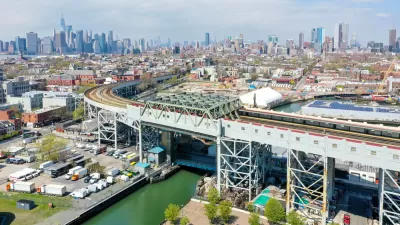A new study calculates the national consequences of restrictive housing regulations in three cities: San Francisco, New York, and San Jose.

Annie Lowrey doesn’t pull any punches in introducing a discussion about the external costs of well-preserved residential neighborhoods: "These neighborhoods are adorable. They are desirable. And they are a total economic disaster."
Lowrey's strongly phrased indictment follows newly released research by Chang-Tai Hsieh of the University of Chicago and Enrico Moretti of the University of California, Berkeley, who study the damage inflicted by constrained housing markets in San Francisco, New York, and San Jose on the larger economy. In other words, the study examines how the growth of cities determines the growth of nations.
And by that measure, the news is not good. According to Lowrey's explanation, the study, "calculates that the United States economy would be nearly 10 percent bigger if just three cities — New York, San Jose, and San Francisco — had loosened their constraints on the supply of housing and let more people in during the past few decades. Let that sink in: 10 percent bigger." That loss is calculated relative to hypothetical conditions imagining those cities with average land use regulations, rather than the highly restrictive regulations that actually exist.
Attentive readers will recall that Timothy B. Lee of Vox picked up news of a discussion draft of the study by Hsieh and Moretti in July 2014. Now the study is complete and made publicly available. Also, at the time, the angle on the study's findings was described differently, focusing on the lost productivity of workers that can't afford to move to cities thanks to the obstruction of NIMBY activists.
FULL STORY: The High Cost of Expensive Townhouses

Alabama: Trump Terminates Settlements for Black Communities Harmed By Raw Sewage
Trump deemed the landmark civil rights agreement “illegal DEI and environmental justice policy.”

Study: Maui’s Plan to Convert Vacation Rentals to Long-Term Housing Could Cause Nearly $1 Billion Economic Loss
The plan would reduce visitor accommodation by 25% resulting in 1,900 jobs lost.

Planetizen Federal Action Tracker
A weekly monitor of how Trump’s orders and actions are impacting planners and planning in America.

Wind Energy on the Rise Despite Federal Policy Reversal
The Trump administration is revoking federal support for renewable energy, but demand for new projects continues unabated.

Passengers Flock to Caltrain After Electrification
The new electric trains are running faster and more reliably, leading to strong ridership growth on the Bay Area rail system.

Texas Churches Rally Behind ‘Yes in God’s Back Yard’ Legislation
Religious leaders want the state to reduce zoning regulations to streamline leasing church-owned land to housing developers.
Urban Design for Planners 1: Software Tools
This six-course series explores essential urban design concepts using open source software and equips planners with the tools they need to participate fully in the urban design process.
Planning for Universal Design
Learn the tools for implementing Universal Design in planning regulations.
Caltrans
Smith Gee Studio
Institute for Housing and Urban Development Studies (IHS)
City of Grandview
Harvard GSD Executive Education
Toledo-Lucas County Plan Commissions
Salt Lake City
NYU Wagner Graduate School of Public Service





























